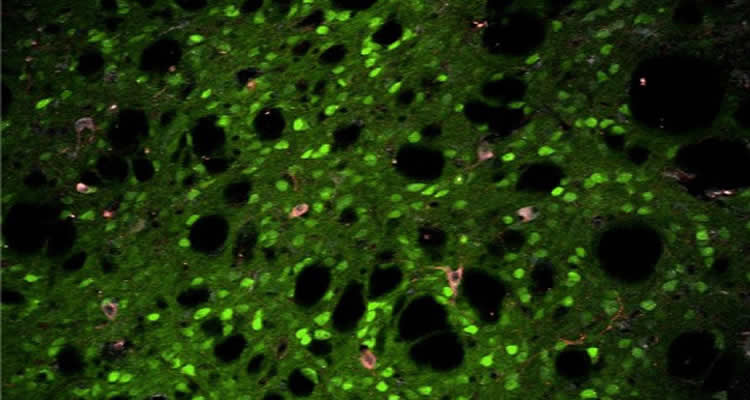The tics seen in Tourette syndrome may be caused by the loss of specific neurons in the brain, a Yale University study has demonstrated.
The findings, which provide a clue to the cause of the symptoms that afflict millions of Tourette patients worldwide, are described in the Jan. 5 online edition of the Proceedings of the National Academy of Sciences.
Previous postmortem studies of people with severe forms of the disease showed that there was a decrease in a rare but important type of neuron in the dorsal striatum, deep within the brain. A team led by Christopher Pittenger, associate professor of psychiatry, investigated whether loss of those neurons could cause the symptoms.
They removed about half of these rare neurons (seen in red in accompanying image), which use the neurotransmitter acetylcholine, in the dorsal striatum of mice. These mice developed tic-like movements when they were stressed or exposed to amphetamine — two conditions that can bring out tics in patients, too.

However, other symptoms seen in Tourette syndrome, such as problems with motor skill learning and filtering sensory information, were not affected. This suggests that loss of these specific neurons may be sufficient to produce tics, but not other symptoms seen in Tourette syndrome, researchers say.
Contact: Bill Hathaway – Yale
Source: Yale press release
Image Source: The image is credited the researchers/Yale and is adapted from the press release
Original Research: Abstract for “Targeted ablation of cholinergic interneurons in the dorsolateral striatum produces behavioral manifestations of Tourette syndrome” by Meiyu Xu, Andrew Kobets, Jung-Chieh Du, Jessica Lennington, Lina Li, Mounira Banasr, Ronald S. Duman, Flora M. Vaccarino, Ralph J. DiLeone, and Christopher Pittenger in PNAS. Published online December 15 2014 doi:10.1073/pnas.1419533112






